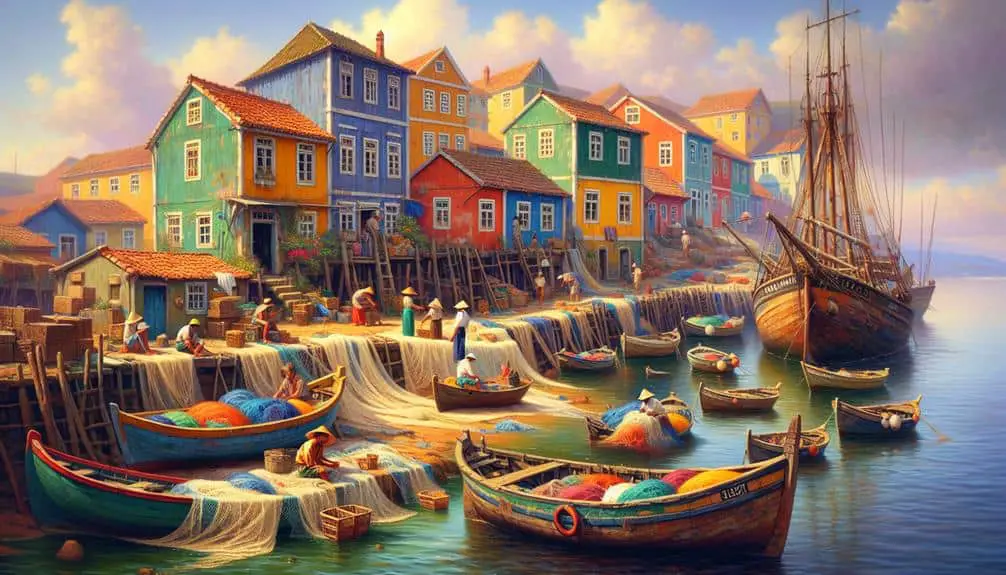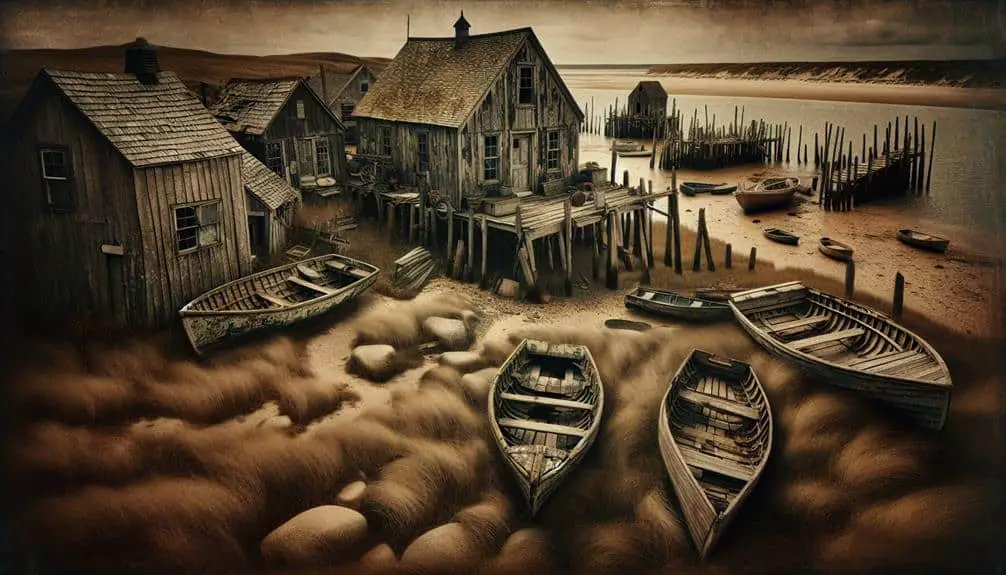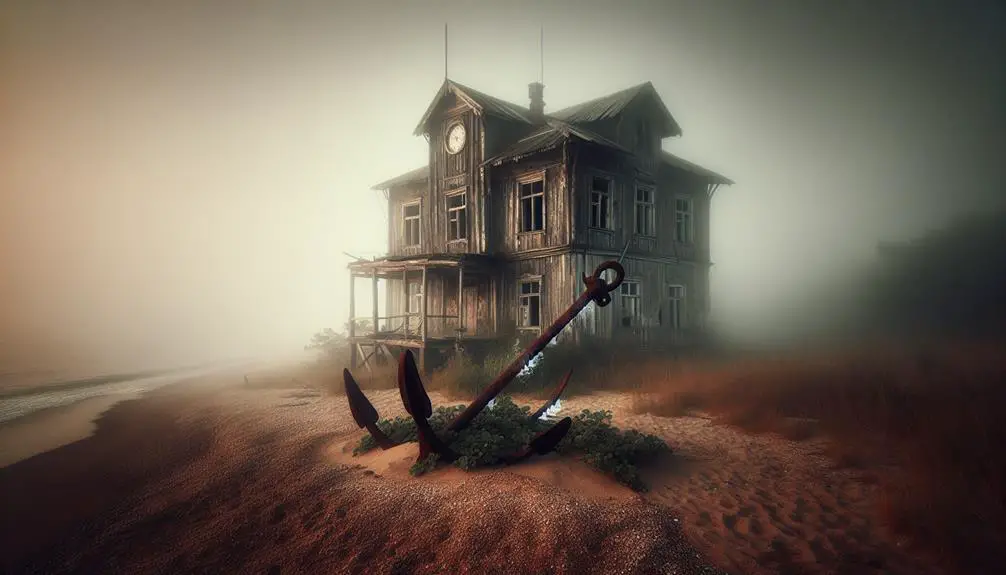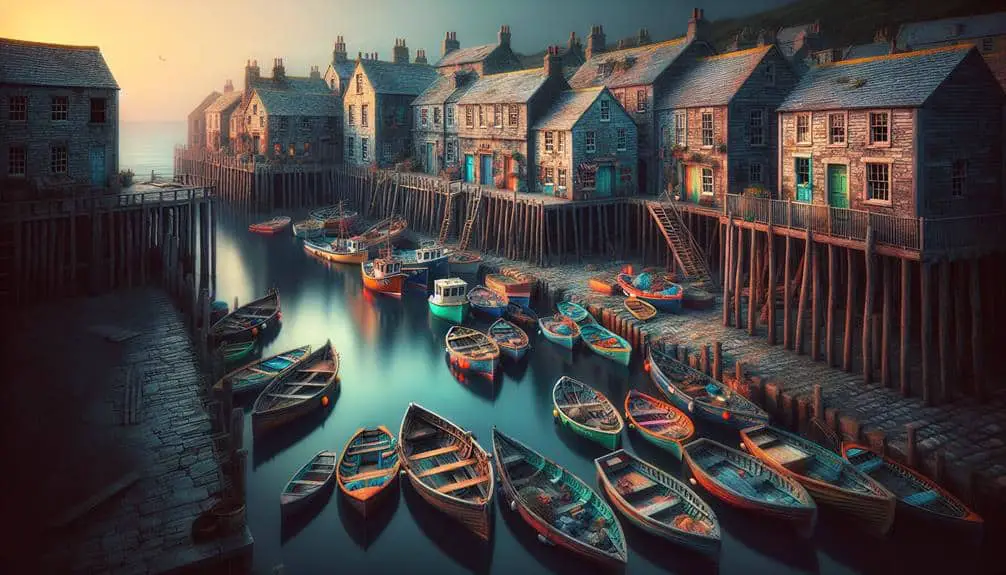Discover the essence of coastal fishing villages' significance. They hold cultural treasures, symbolize tradition, and preserve community roots. These historical sites embody authenticity, inviting you to explore history while connecting with the past. Uncover the economic importance supporting local livelihoods and sustaining small businesses. Coastal villages protect against erosion, nurture diverse ecosystems, and provide havens for wildlife. Embrace educational journeys blending cultural immersion and historical education. Reveal the interwoven tales of maritime legacy within these coastal gems. Embrace the legacy, beauty, and significance these villages offer through their historical sites.
Key Points
- Preserve historical significance and traditional values.
- Uphold community identity and foster pride.
- Contribute to ecosystem protection and biodiversity.
- Offer tourism and educational opportunities.
- Showcase local maritime heritage and fishing traditions.
Preservation of Cultural Heritage
Preserving the cultural heritage of coastal fishing villages is essential for maintaining the historical significance and traditional values of these communities. Cultural preservation plays an important role in safeguarding the unique identity of these villages, ensuring that future generations can appreciate and learn from their rich history. By protecting historical sites, traditional practices, and artifacts, the community identity is upheld, fostering a sense of pride and connection among residents and visitors alike.
The preservation of cultural heritage in coastal fishing villages also contributes to the overall charm and authenticity of these communities. Through maintaining historical buildings, fishing techniques, and local customs, the cultural fabric of the village remains intact, offering a glimpse into the past while adapting to present-day needs. This balance between preservation and progress is crucial for sustaining the essence of these villages and attracting those who seek to experience the genuine character and traditions they embody.
Economic Impact on Local Communities
The economic prosperity of coastal fishing villages is intricately intertwined with the preservation of their cultural heritage and historical sites. These villages serve as hubs for community development, offering a unique setting where traditions and livelihoods are sustained and passed down through generations. By protecting and promoting these historical sites, local communities can tap into sustainable livelihoods that not only benefit individuals but also contribute to the overall economic well-being of the area.
Historical sites in coastal fishing villages often attract tourists, providing a source of income for local residents through activities like guided tours, artisanal crafts, and traditional culinary experiences. This influx of visitors not only boosts the local economy but also creates opportunities for small businesses to thrive, further enhancing the fabric of the community.
Moreover, preserving these historical sites fosters a sense of pride and identity among residents, encouraging a shared commitment to maintaining the cultural heritage that defines their community. By investing in the conservation of these sites, coastal fishing villages can secure a prosperous future built on sustainable practices and a deep connection to their past.
Environmental Significance
Historical sites in coastal fishing villages not only play a vital role in the economic prosperity of local communities but also hold significant environmental significance in preserving fragile ecosystems and biodiversity.
The presence of these historical sites can contribute to ecosystem protection by acting as natural barriers against coastal erosion. The structures and vegetation in these areas help absorb wave energy, reducing the impact of erosion on the coastline.
Additionally, these sites provide habitats for various species of flora and fauna, contributing to biodiversity conservation.
Tourism and Education Opportunities
For travelers and learners alike, coastal fishing village historical sites offer enriching experiences that intertwine cultural exploration with educational discovery. The tourism benefits of visiting these sites are plentiful, providing opportunities for individuals to immerse themselves in the rich history and traditions of coastal communities. Through guided tours, interactive exhibits, and hands-on activities, visitors can gain a deeper understanding of the fishing industry's evolution and its impact on local economies and cultures.
Educational programs hosted at these historical sites cater to a wide range of interests and age groups, making them ideal destinations for school field trips, family outings, or solo adventures. These programs often include workshops on traditional fishing techniques, demonstrations of artisanal crafts, and presentations on the ecological importance of coastal environments. By participating in these activities, visitors not only expand their knowledge but also develop a deeper appreciation for the interconnectedness of history, culture, and the environment.
Connection to Local Maritime History
Discover the intricate ties between coastal fishing villages and their maritime heritage through interactive exhibits and firsthand accounts. These villages aren't just picturesque settings but living repositories of local traditions and fishing techniques that have sustained communities for generations. By delving into the history of coastal fishing villages, you can uncover the deep-rooted connections between the people and the sea.
Local traditions play a crucial role in shaping the identity of coastal fishing communities. From unique festivals celebrating the bounty of the ocean to traditional songs passed down through the ages, these customs reflect the intimate relationship between the villagers and the maritime environment. Understanding these traditions provides insight into the cultural significance of fishing in these communities.
Fishing techniques, honed over centuries of trial and error, showcase the ingenuity and resourcefulness of coastal fishermen. From intricate net weaving to the art of maneuvering treacherous waters, these techniques highlight the expertise required to thrive in a challenging marine environment. Exploring the evolution of fishing practices offers a glimpse into the resilience and adaptability of coastal communities in the face of changing seas.
Frequently Asked Questions
How Do Coastal Fishing Village Historical Sites Contribute to Local Folklore and Storytelling Traditions?
Coastal fishing village historical sites hold treasures of folklore and storytelling, vital for preserving local heritage. Immerse yourself in tales passed down through generations, connecting with the past and community traditions that shape identities.
What Measures Are Taken to Ensure the Safety and Accessibility of These Historical Sites for Visitors and Researchers?
To guarantee the safety and accessibility of historical sites, safety measures like signage, barriers, and regular maintenance are implemented. Accessibility initiatives such as ramps and designated paths enable visitors and researchers to explore these sites comfortably.
Are There Any Ongoing Archaeological Excavations or Research Projects Focused on Coastal Fishing Village Historical Sites?
If you're curious about ongoing archaeological excavations or research projects focused on coastal fishing village historical sites, you'll be fascinated by the exploration of underwater archaeology. Discover how experts preserve maritime heritage through conservation efforts.
How Do These Sites Play a Role in Promoting Cultural Diversity and Cross-Cultural Exchange?
In coastal fishing villages, you experience a melting pot of traditions, fostering cultural exchange. These sites preserve heritage, showcasing diverse practices. By immersing in these histories, you appreciate the rich tapestry of human experiences and connections.
What Are Some Lesser-Known Stories or Anecdotes About the People Who Lived and Worked in These Coastal Fishing Villages Throughout History?
As you explore coastal fishing villages, stumble upon hidden treasures of forgotten traditions. Discover daily rituals and untold tales of those who once inhabited these shores, painting a vivid picture of their lives.



